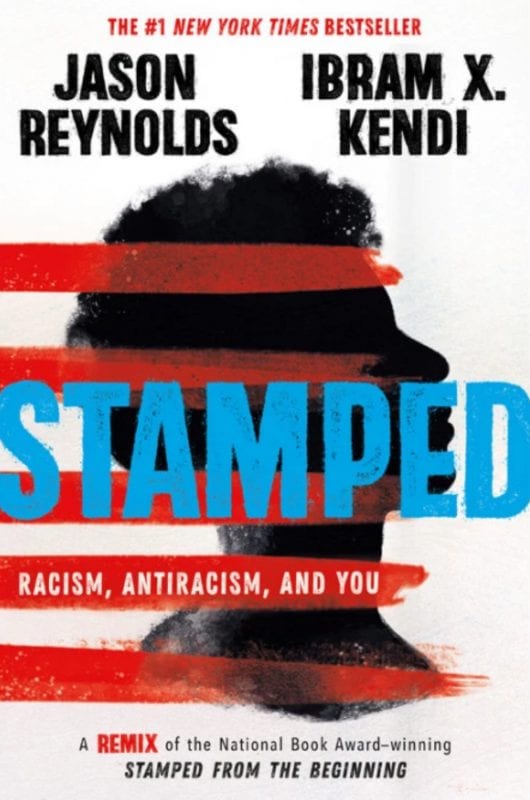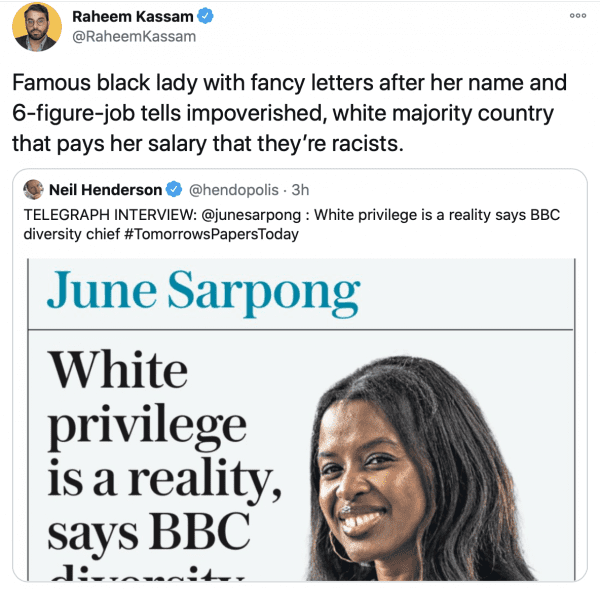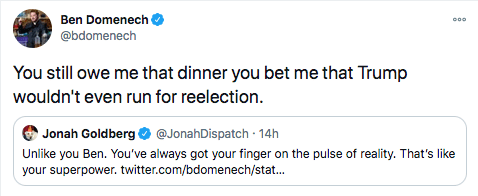Archive for 2020
December 27, 2020
December 26, 2020
OPEN THREAD: Enjoy.
WELL, YES: SpaceX Starship prototype exploded, but it’s still a giant leap toward Mars.
UPDATE: This P.J. Media take, on the other hand, is kind of embarrassing.
Related: “#ProTip, Drew. If you’re worried about taxpayer money being wasted on space progress, go dig into SLS/Orion.” Right?
I CERTAINLY HOPE SO: NYT wonders: Do Dem setbacks in California portend disaster in 2022?
TRUST IS PUBLIC HEALTH’S GREATEST ASSET. WEIRD THAT THEY’RE SO WILLING TO SQUANDER IT. Dr. Fauci justifies lies, saying Americans can’t handle the truth.
A SUBJECT NOBODY EVER ARGUES ABOUT: Selecting The Right Caliber For Self-Defense.
BOOK CRITICIZING CANCEL CULTURE GETS CANCELED BECAUSE AUTHOR CRITICIZED ISLAM:
You may have thought the public discourse couldn’t get any more absurd. Think again. Apparently oblivious to the titanic dimensions of the irony, the publisher Little, Brown just canceled a new book, Welcome to the Woke Trials: How #Identity Killed Progressive Politics by British journalist Julie Burchill because of an “Islamophobic” twitter exchange Burchill had with Muslim writer Ash Sarkar. So you see, it’s fine to stand up for freedom of speech, but some lines must not be crossed. And what was Burchill’s crime? Did she use racial slurs? Did she call for genocide or violence against innocent Muslims? No, apparently all she did was note the readily demonstrable fact that according to Islamic tradition, Muhammad married a child. But telling the truth is a dangerous enterprise these days.
You may not be interested in cancel culture, but cancel culture is interested in you. Read the whole thing.
Little, Brown is owned by Hachette, whose crybully staffers previously cancelled Woody Allen’s autobiography, and threatened to cancel Jordan Peterson’s sequel to best-selling 12 Rules for Life earlier this year. However, they publish such fare as this in their “young adult” category:

Hachette has certainly gotten ultra-woke. I’d ask if going broke is the next step, but the 21st century left certainly enjoys donning their hair shirts.
(Updated and bumped.)
EXTENDED LOCKDOWNS WILL TURN OUT TO HAVE COST MORE LIVES THAN THEY SAVED: Oncologist fears ‘tsunami of cancer’ after COVID-19 lockdowns limited screening.
JOHN ROSENBERG: “If Democrats Win in Georgia, Racial Equality Loses.”
WASHINGTON POST: DENYING ELECTION RESULTS IS LIKE DENYING HOLOCAUST.
(Link safe, goes to Breitbart.com.) Over the years, I’ve been pretty tough on Al Gore, John Kerry, Hillary Clinton, Barack Obama, Joe Biden, and Stacey Abrams. Unlike the Post though, I’ve never believed any of these politicians were Holocaust deniers. But I’m glad the paper has finally decided to root out the increasing Corbynization of their fellow Democrats.
LIFE IN THE 21ST CENTURY:

The race-grifting will continue, as long as it’s safe, prestigious, and high-paying.
JEFFREY TOOBIN AND THE MEDIA’S CURIOUS CODE OF DECENCY:
In 2008, Toobin had an affair with Casey Greenfield, the much-younger daughter of veteran political journalist Jeff Greenfield. When Casey Greenfield became pregnant, Toobin reportedly offered her money to have an abortion. When she refused, he told her he would make her regret the decision. After the child was born, Toobin had to be dragged into court and forced to pay child support.
Yet, according to some of his notable colleagues, the real problem here is judgmental prudes. One of Toobin’s New Yorker colleagues, trans activist Masha Gessen, dismissed the incident. “I think it’s tragic that a guy would get fired for really just doing something really stupid,” Gessen told the Times. “It is the Zoom equivalent of taking an inappropriately long lunch break, having sex during it and getting stumbled upon.”
Another New Yorker writer, best-selling author Malcolm Gladwell, told the Times “the only way I could explain [Toobin’s firing] … was that Condé Nast had taken an unexpected turn toward traditional Catholic teaching.” To drive the point home, “Mr. Gladwell then took out his Bible and read to a reporter an allegory from Genesis 38 in which God strikes down a man for succumbing to the sin of self-gratification.”
Gladwell’s superficial understanding of Scripture might be a surprise to readers of his thought-provoking books and, in any event, was a weak attempt to cast doubt on the idea Toobin violated agreed-upon standards of decency. Moreover, it’s hard to imagine there are many jobs in secular America, let alone in vocations heavily dependent on public credibility, where you can turn into Onan the Barbarian in front of dozens of colleagues and still collect a six-figure salary.
In general, excusing libertine elites such as Toobin raises uncomfortable questions for the media. Do black lives matter when 70% of African American children are born out of wedlock? What about the fact that 36% of abortions are performed on African Americans even though they represent 13% of the population – doesn’t that inequality reflect some kind of institutional racism? Don’t expect any serious consideration of these issues coming to an op-ed page near you soon.
Remember #MeToo? It seems so long ago. As Dan McLaughlin wrote in October, “What should shock us is that Toobin has yet to be fired [the New Yorker finally announced Toobin was gone in mid-November, and CNN’s management apparently still haven’t made up their minds yet — Ed], when nearly anyone else would be — any ordinary person, and almost any prominent person whose politics were different from Toobin’s. Instead, it took over a week for anyone to even disclose that he had been disciplined at all. This is perhaps not a great sign regarding how much the media have learned since Matt Lauer, Charlie Rose, or Mark Halperin. This is by no means the first indication of Toobin’s horrible, abusive sexual morals.”
HOW CHRISTOPHER LASCH LEFT THE LEFT:
American conservatism, for Lasch, took the assumptions of economic liberalism for granted. In a late essay published in the journal First Things, he remarks that “if conservatism is understood to imply a respect for limits, it is clearly incompatible with modern capitalism or with the liberal ideology of unlimited economic growth.” The acquisitive individualism that is inseparable from this ideology instills a set of attitudes and expectations that undermine not only traditions and communities, but the institutions that the right historically revered as moderating influences against greed and excess: the family and small-scale property ownership. Lasch observes that “twentieth-century capitalism… has replaced private property with a corporate form of property that confers none of these moral and cultural advantages. The transformation of artisans, farmers, and other small proprietors into wage-earners undermines the ‘traditional values’ conservatives seek to preserve.” He concludes: “capitalism’s relentless erosion of proprietary institutions furnishes the clearest evidence of its incompatibility with anything that deserves the name of cultural conservatism.”
Taken as a whole, Lasch’s body of writing offers an account of the limitations of the American political panorama of his era. Conservatism, he suggests, tends to provide de facto ideological cover for the economic developments that have eroded the social values it claims to promote. Liberalism, for its part, has overseen the rise of a state bureaucratic apparatus that promises to compensate for the effects of this erosion. However, in the process, it further weakens the autonomy of individuals, families, and communities, and enables the substitution of democracy with technocratic elite rule. While the New Left of the 1960s rebelled against the expansion of corporate and bureaucratic power, the end result of its revolt was not a reassertion of the local and the communal, but the infusion of those structures with a new therapeutic sensibility.
Over the past year, the COVID-19 pandemic has exacerbated many of the economic, social, and cultural tendencies Lasch deplored. While small businesses have collapsed in record numbers and average families have found themselves destitute, the major tech companies and retail conglomerates like Amazon have reaped massive profits and the stock market has soared; in response, the political class has delivered aid packages that blatantly favor the interests of the latter. As Alex Gutentag recently argued, “the pandemic is a convenient scapegoat for the largest upward wealth transfer in modern human history.” Lasch’s work suggests that the roots of this crisis extend far back into the last century, during which both liberals and conservatives, for different reasons, became increasingly indifferent to the degradation of average people’s lives and livelihoods. He offers us no easy alternatives, but his writings reveal the scale of the problems anyone attempting to look beyond the failings of liberalism must confront.
Read the whole thing.
IT’S COME TO THIS: CBS Frets Too Much Emailing Contributes to Global Warming.
Phillips then turned to environmental author Mike Berners-Lee for the usual carbon-footprint lecture: “But, on the other hand, if you’re at home with the heating on, which it wouldn’t otherwise have to be, then that’s not so good, and you’re probably using more computing stuff than you would be.”
Phillips then recounted that it takes lots of energy to process e-mails, noting the huge quantities that are sent. He then related a British study estimating that “if everyone in Britain sent one less “thank you” e-mail a day, the carbon saving would be like taking about three and a half thousand cars off the road.”
“Hold the smugness” is probably not something CBS should be throwing at the viewers. Somehow, Phillips didn’t try to do the calculation of how much power is horrendously spent on people watching CBS.
This episode of CBS This Morning was sponsored in part by Nissan, which is also ironic with the carbon impact.
Now informed of this knowledge, I assume that CBS will immediately respond by shutting down its Internet server farm, its television broadcasting facilities, or if they’re really serious about the gospel they’re preaching, both. C’mon CBS executives — show us that you take your own news division’s advice seriously!
FOR TWO WEEKS IT WASN’T THAT HARD. FOR NINE MONTHS IT BORDERS ON INSANE. Stop Saying Lockdown Is ‘Not That Hard:’ Staying isolated from family and friends is wrenchingly difficult, even when it’s the right thing to do.

